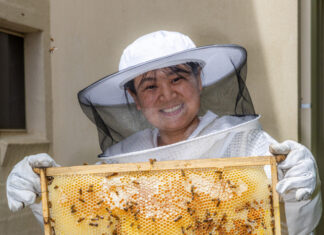By Elizabeth Lillis
GEMBROOK MP Tammy Lobato has sparked a debate with a former political rival after raising doubts about the ‘unnecessary medicalisation’ of women through a vaccination for cervical cancer.
The vaccine known as Gardasil protects young women from contracting a wart virus that can lead to cervical cancer.
Her comments have drawn a strong response from former Gembrook Liberal candidate Simon Wildes and his wife, Kerryn.
Speaking in State Parliament last Wednesday, Ms Lobato said she would advocate for preventative health measures instead of a reactive approach adopted by many in the interests of increasing the profit of pharmaceutical companies.
“If women do not smoke but eat healthily, exercise, generally live well and use a condom when having sex if they or their partners have other partners, they are unlikely to develop cervical cancer,’’ she said in Parliament.
Mrs Wildes had precancerous cells identified in recent pap smears.
Responding to Ms Lobato’s comments, Mr Wildes, in a letter to the Gazette, said: “My wife, Kerryn, eats well, exercises, doesn’t smoke and we use condoms.
“According to Ms Lobato’s thorough medical knowledge this should prevent her developing cervical cancer,’’ he said.
Mrs Wildes said she had found Ms Lobato’s comments offensive.
“She doesn’t seem to have all the facts… she hasn’t had a scare like this,’’ she said.
Mrs Wildes had part of her cervix removed after the precancerous cells were found.
She has to have six monthly invasive tests to check for further problems.
Ms Lobato stood by her statement early this week, saying a universal vaccination program was not warranted when four per 100,000 in Australia develop cervical cancer of whom one per cent die from the disease.
Ms Lobato said more than 85 per cent of cervical cancer and cervical cancer deaths are accounted for by women in developing countries.
“I want women to understand the nature of this disease and, armed with information, make their own choices about this vaccination,’’ she said.
Ms Lobato said one had to question whether the implementation of a widespread vaccination program for a virus that will never pose a health risk to the vast majority of women was the best use of limited health resources.
Mr Wildes said her views seemed to be out of step with the State Labor Government policy which had committed to distributing the cervical cancer vaccine to all Victorian secondary schools.
Mrs Wildes said she and her family had made efforts to live a healthy life but she had still developed precancerous cells.
Mrs Wildes said she would be having her daughters immunised when the vaccine became available and immunisation programs were not compulsory so people could opt out if they objected for some reason.
“I would have had such a vaccine if it been available if it meant not having to go through what I’ve been through in the past few years,’’ she said.
Ms Lobato said she did see a place for targeted use of the cervical cancer vaccine in cases where there was a family history of the disease.
She also indicated she has supported a close relative through a battle with the disease.
“Every death due to cancer is a tragedy.
“However, tackling cancer necessitates people becoming aware of the facts and having all the relevant information at hand so that they can make an informed decision’’ Ms Lobato said.
MP in cancer vaccine row
Digital Edition
Subscribe
Get an all ACCESS PASS to the News and your Digital Edition with an online subscription
Q&A with beekeeper Alice Lin
What inspired you to start beekeeping, and how long have you been doing it?
I’ve only been learning beekeeping for a few months. Earlier this...







